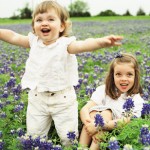 I think there should be a whole new movement in education called “children’s peak experiences in learning.” There ought to be books about it, M.Ed. and Ph.D. degree programs about it, tons of research about it. Why? Because when we observe learning at its best, only then do we have true benchmarks to evaluate the soundness of an educational program. What do educators currently use as benchmarks for this purpose? Test scores. Come on, let’s think clearly about this. Can you ever in your wildest imagination conceive that learning at its best could ever occur during a standardized test? Have you ever heard of a great thinker or individual of significant cultural achievement–an Einstein, a Picasso, a Beethoven– ever say, “you know, the greatest learning experience of my life was when I took that standardized test in second grade. It truly made a huge impact upon my life.” Of course not. The very idea of it is absurd. So, what do highly accomplished and deeply creative people talk about when they speak of their own peak learning experiences? Here are some examples:
I think there should be a whole new movement in education called “children’s peak experiences in learning.” There ought to be books about it, M.Ed. and Ph.D. degree programs about it, tons of research about it. Why? Because when we observe learning at its best, only then do we have true benchmarks to evaluate the soundness of an educational program. What do educators currently use as benchmarks for this purpose? Test scores. Come on, let’s think clearly about this. Can you ever in your wildest imagination conceive that learning at its best could ever occur during a standardized test? Have you ever heard of a great thinker or individual of significant cultural achievement–an Einstein, a Picasso, a Beethoven– ever say, “you know, the greatest learning experience of my life was when I took that standardized test in second grade. It truly made a huge impact upon my life.” Of course not. The very idea of it is absurd. So, what do highly accomplished and deeply creative people talk about when they speak of their own peak learning experiences? Here are some examples:
“When she was eight [Anna Pavlova] was taken as a special Christmas treat to see a performance of The Sleeping Beauty by the Imperial Russian Ballet. She wrote later: “I was spellbound. I gazed and gazed, and wild plans began to circulate in my brain.”
(Lessons from Childhood, R.S. and C.M. Illingsworth)
“As an adolescent, Richard Wagner heard a famous singer in Fidelio and was greatly moved. He wrote the singer a letter in which he dedicated his life to music, delivered it to her hotel room, and then ‘ran out into the street, quite mad.”
(Joseph Walters and Howard Gardner, “The Crystallizing Experience”)
“If I were asked to name the chief event in my life, I should say my father’s library. In fact, sometimes I think I have never strayed outside that library.”
(Jorge Luis Borges, “Autobiographical Essay”)
“When I was ten years old and I operated my first magic lantern–with its chimney, its petrol lamp, and its constantly repeating films–I found the above phenomenon exciting and mysterious. Even today, I feel in myself the nervous excitement of childhood.”
(Ingmar Bergman, “The Magic Lantern”)
“From my earliest years, I had a great desire to enquire into the causes of all those little things and events which astonish the childish mind. My invisible question on receiving any new toy was: ‘Mamma, what is inside of it?”
(Charles Babbage, computer pioneer)
“From infancy I was surrounded by music . . . To hear my father play the piano was an ecstasy for me. When I was two or three, I would sit on the floor beside him as he played, and I would press my head against the piano in order to absorb the sound more completely.”
(Pablo Casals, Joys and Sorrows; Reflections)
I think you get the idea. There is no mention of test results. Yet, right now, in the United States and elsewhere in the world, teachers are being evaluated, hired, fired, and paid, at least in part, on the basis of how well they are able to raise their students’ test scores. Can you imagine anything more moronic? Everywhere these days, the education discourse is about “closing the gap” and “raising the bar.” Well, let’s do it then. But let’s consider the “bar” the types of experiences described above. If a teacher can’t create an environment where these types of peak experiences of learning in their students have an opportunity to emerge, then I don’t care what their students’ test scores are. I want all of us (parents, educators, and others who care about education) to raise a great hue and cry that these ecstastic experiences should be the standard upon which all good teaching (and parenting) should be measured. We’ve got to change the conversation, people. We need to stop moaning about test results, and start using the types of experiences described above as the basis for all future discourse about learning. If we really did this, we’d see a lot of very wonderful things start to happen in education within a very short time.
For more information about children’s peak experiences in learning, see my book: If Einstein Ran the Schools: Revitalizing U.S. Education
This article was brought to you by Thomas Armstrong, Ph.D. and www.institute4learning.com.
Follow me on Twitter: @Dr_Armstrong



















